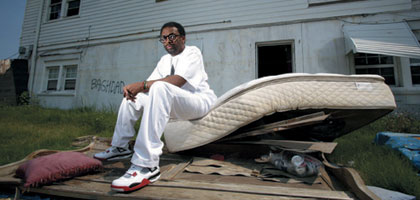Primary navigation


Kaleem Aftab talks to Spike Lee about the making of When the Levees Broke
When Hurricane Katrina struck the coast of Louisiana on 29 August 2005 Spike Lee was at the Venice lm festival. Just over a year later he was back - this time to talk about When the Levees Broke: A Requiem in Four Acts, his documentary about the destruction of New Orleans. The four-and-a-quarter-hour lm moves swiftly to the conclusion that Hurricane Katrina wasn't the only cause of the devastation; administrative chaos and poor planning contributed too.
The beguiling montage of interviews, archival footage and investigative journalism is similar in style to Lee's two previous feature-length documentaries, the Oscar-nominated 4 Little Girls (1997) and Jim Brown: All American (2002), except that rather than pre-emptively accusing people, as was sometimes the case in the past, here the director tends to allow them to tie their own noose. Showing great skill and sensitivity as he questions over 100 interviewees, he makes heroes of New Orleans' disenfranchised residents while lambasting the officials who failed to protect them.
Kaleem Aftab: You've described the important contribution of your researcher Judy Avey to the project.
Spike Lee: I've been working with Judy for years, and she was crucial to Levees. Not only did she feed us information so we could educate ourselves about global warming, the levee system, the politics of Louisiana, voodoo, the origins of jazz and all that stuff, but she also got us the newsreel and archive footage, and more. I was stuck in New York doing Inside Man, so we began shooting refugees in New York before we got down to New Orleans. Judy had already found a lot of the people who've ended up in the lm just by walking around the city and asking them for their stories. A documentary is only as good as its participants, and we were blessed that we got a great representation.
Was there any story that particularly struck you?
People were passionate about letting the world know about their ordeal. So early on my producer Sam Pollard and I knew we had to have people testify. These people are witnesses to the greatest disaster in the United States of America. So it was our job not to get in the way but to give them a vehicle to share their horrors, triumphs, everything that's part of being a human going through hell.
Was being in New Orleans different to how you'd imagined it from watching the events on television?
All the newsreel footage, all the photographs in newspapers and magazines couldn't prepare you for the scale of the destruction. You could turn around in a circle and see nothing but devastation.
When did you decide to make the film in four acts?
When Sam Pollard and I pitched it to Sheila Nevins and Jackie Glover at HBO it was for two hours. They said, we have $1 million, Spike, and you can't get a penny more, and we said ne. The original concept was going to be a bunch of musicians - the Neville Brothers, Dr. John - playing songs written about Katrina among the ruins, but that never happened. And the more Sam and I shot, the more we cut, we realised two hours wasn't going to do it. Then we had to go back to Sheila and say we needed four hours.
Why did you subtitle the film a requiem?
The requiem is said out of respect for those who have died and are still dying, and I think the title elevated the project above some run-of-the-mill documentary. But even at four hours it's incomplete. This portrait of New Orleans is not done and, borrowing from Michael Apted, I want to stay in this. Most experts say it'll be ten to 15 years before the city gets back to where it was.
It seems you've come to the same conclusion as the insurance companies: that it was the floods, not Katrina, that caused the damage.
I don't know if I necessarily agree with that. Insurance companies are fucking people over, giving them a dime on their dollar. I'm saying there was a lot of destruction from the hurricane before the levees broke, but Katrina didn't put 80 per cent of the city under water.
Do you think the blame lies across the board, from local to federal government?
What we saw was a complete breakdown on a federal, state and local level, but I put most of the blame on federal government. No one has yet managed to explain why it took ve days for them to arrive when we've all seen the US government be in Sri Lanka within a day and a half.
You've said that when you first saw the chaos and destruction on screen, what you saw was only African Americans, but when you got down there you realised it was a problem of poor folk, no matter what their race.
I knew Bush didn't care about white folks in America either. But when I got to New Orleans and visited St. Bernard's Parish people were telling me that they'd had as much death and destruction as the Lower 9th Ward, but the media was focused on Lower 9th Ward, on the looting and the people seeking refuge in the Superdome and the convention centre.
A lot of your friends agreed to take part, including trumpeters Winston Marsalis and Terence Blanchard.
It's an added bonus when you can have people who know you be a part of it. I remember asking Terence if his mother had returned home yet, and telling him he had to let us lm the moment. He admitted he wasn't too sure it was a good idea at the time, but having watched the lm he's glad he did so.
I've heard you're doing a series based in New Orleans.
I've a development deal with NBC for a dramatic series called NoLa, the initials for New Orleans, Louisiana. I'm working with a young writer, Sid Quashie, to develop a one-hour pilot for a show that deals with people from different social and economic backgrounds who are trying to put their lives back together. We're using neorealist Italian films like Rome Open City as the model, films that took place in an Italy devastated by World War II.
There's a poignant moment in your film where you contrast George Bush's reaction to Katrina to that of President Johnson after Hurricane Betsy.
A politician is a politician, but God damn this guy and his legacy. He's very close to going down as one of the worst presidents in the history of the United States of America.